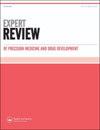布加替尼治疗alk阳性非小细胞肺癌
IF 1.2
Q4 PHARMACOLOGY & PHARMACY
Expert Review of Precision Medicine and Drug Development
Pub Date : 2021-07-19
DOI:10.1080/23808993.2021.1954907
引用次数: 0
摘要
间变性淋巴瘤激酶(ALK)基因重排和由此产生的融合蛋白发生在3%-7%的非小细胞肺癌(NSCLC)患者中,赋予ALK酪氨酸激酶抑制剂治疗敏感性。继第一代ALK抑制剂克唑替尼之后,新一代ALK抑制剂已被开发出来,并在crizotinib-naïve和克唑替尼难治性晚期NSCLC患者中显示出更大的效力和脑穿透性。布加替尼是一种有效的、高选择性的第二代ALK抑制剂。Brigatinib已被美国食品和药物管理局(fda)和欧洲药品管理局(ema)批准用于alk阳性晚期NSCLC患者,此前曾接受过克里唑替尼治疗,最近作为naïve患者的一线治疗。在当前的综述中,我们介绍了最新的关于疾病生物学、新出现的临床决策和晚期非小细胞肺癌ALK易位的靶向治疗选择的当前和不断发展的临床数据,特别是关注布加替尼的活性。专家意见布里加替尼在临床研究中对naïve和难治性转移性alk阳性NSCLC患者均显示出深度全身和颅内疗效,标志着其临床发展。鉴于其疗效和耐受性,布加替尼可能是治疗晚期alk阳性NSCLC患者的一种极好的治疗选择。本文章由计算机程序翻译,如有差异,请以英文原文为准。
Brigatinib as a treatment of ALK-positive non-small cell lung cancer
ABSTRACT Introduction Anaplastic lymphoma kinase (ALK) gene rearrangements and resulting fusion proteins occur in 3%-7% of patients with non-small-cell lung cancer (NSCLC), conferring sensitivity to treatment with ALK Tyrosine-Kinase Inhibitors. After the first-generation ALK inhibitor crizotinib, newer generation ALK inhibitors have been developed and showed greater potency and brain penetration in both crizotinib-naïve and crizotinib-refractory advanced NSCLC patients. Areas covered Brigatinib is a potent and highly selective second generation ALK inhibitor. Brigatinib is approved by Food and Drug Administration and European Medicines Agency for ALK-positive advanced NSCLC patients previously treated with crizotinib and more recently as first-line treatment in naïve patients. In the current review we present an up-to-date overview of the current and evolving clinical data regarding the biology of the disease, the emerging clinical decision-making and the targeted therapy options in advanced NSCLC harboring ALK translocation, especially focusing on the activity of brigatinib. Expert opinion Brigatinib shows a deep systemic and intracranial efficacy in both naïve and refractory metastatic ALK-positive NSCLC patients in the clinical studies, which marked its clinical development. Given its efficacy and tolerability brigatinib could be an excellent therapeutic option for the treatment of advanced ALK-positive NSCLC patients.
求助全文
通过发布文献求助,成功后即可免费获取论文全文。
去求助
来源期刊

Expert Review of Precision Medicine and Drug Development
PHARMACOLOGY & PHARMACY-
CiteScore
2.30
自引率
0.00%
发文量
9
期刊介绍:
Expert Review of Precision Medicine and Drug Development publishes primarily review articles covering the development and clinical application of medicine to be used in a personalized therapy setting; in addition, the journal also publishes original research and commentary-style articles. In an era where medicine is recognizing that a one-size-fits-all approach is not always appropriate, it has become necessary to identify patients responsive to treatments and treat patient populations using a tailored approach. Areas covered include: Development and application of drugs targeted to specific genotypes and populations, as well as advanced diagnostic technologies and significant biomarkers that aid in this. Clinical trials and case studies within personalized therapy and drug development. Screening, prediction and prevention of disease, prediction of adverse events, treatment monitoring, effects of metabolomics and microbiomics on treatment. Secondary population research, genome-wide association studies, disease–gene association studies, personal genome technologies. Ethical and cost–benefit issues, the impact to healthcare and business infrastructure, and regulatory issues.
 求助内容:
求助内容: 应助结果提醒方式:
应助结果提醒方式:


